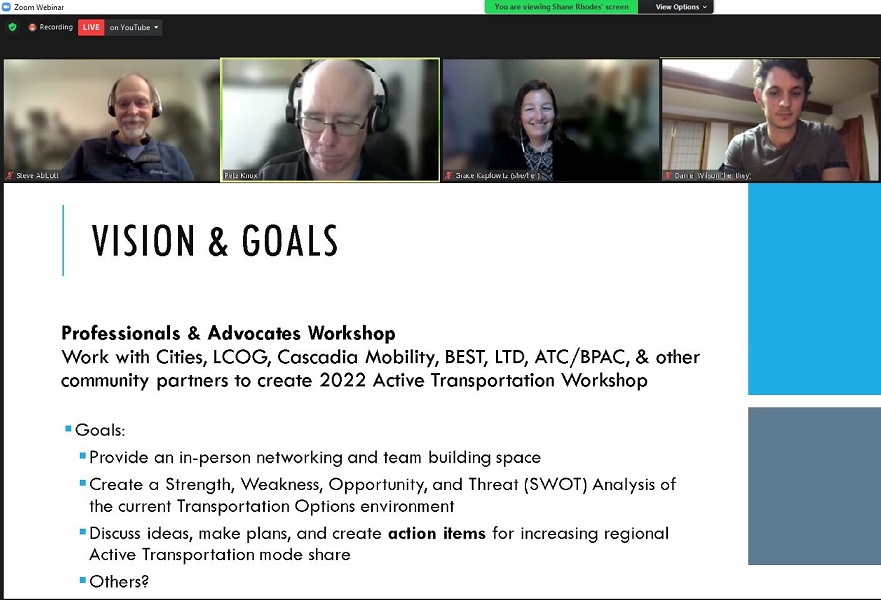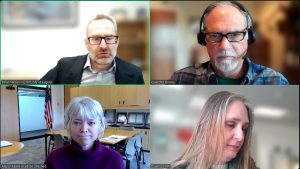Departing Active Transportation Committee members pass the torch
4 min read
Departing ATC members offered valedictories as the new committee members gear up for an ATC summit in 2022.
Departing members offered farewells to the Active Transportation Committee.
[00:00:05] Steve Abbott: When I was first beginning my tenure on the ATC what would I tell myself that I wish I knew then?
[00:00:10] First is, really study the Transportation System Plan (TSP). It’s really the roadmap for success for all of our goals. There are evaluation criteria in the TSP that I think ought to be used to gauge progress, for instance, reduce vehicle miles traveled per capita by 10 percent by 2020, and also reduce greenhouse gas emissions 10 percent below 1990 levels by 2020. Have we done it? I doubt that anybody could really say whether we have or not. I even doubt that there’s widespread consensus on how to measure those things. They’re very important metrics and really it’s the Rosetta stone to figure out what we should be spending money on and what we shouldn’t.
Thank you for supporting
local civic journalism
[00:00:48] I would say give more emphasis to engaging the broader public on the goals and the successes related to TSP, because I see a lot of evidence on social media that people in the broader community just don’t get it. They don’t know what the drainage, what the pedestrian bump-outs are for. They don’t know why the cycle tracks, why the rain gardens, things like that. They just don’t understand. Communicate the goals and get more of the public onboard to understand, because otherwise they’re not going to be supportive.
[00:01:15] And then find more opportunities to collaborate with the Springfield BPAC (Bicycle Pedestrian Advisory Committee). We share the same goals and a lot of the same challenges and the public largely uses the same infrastructure across the city without recognizing the city boundaries so much.
[00:01:30] Grace Kaplowitz: I really enjoyed some of the events and special projects that we got to participate in and be part of. The most recent one I went to was the Parking Day that other folks on this committee put on. And that was incredible and really great to see.
[00:01:42] In terms of ideas for growth, I’ve had it on my list to try and think about this Work Plan topic for quite some time. So I’m really thrilled that’s happening this year. And I hope that that’s a useful tool for you all moving forward.
[00:01:53] I think also something that the committee has been doing a lot more of is communicating with external groups and with boards and committees and councils. And I think I had written down the note to try and do either annual or semi-annual reports to City Council talking about what the committee is up to. So it was just to continue to encourage you all to make those connections and spread your good work far and wide.
[00:02:12] Maybe a slight reminder or just an idea to think a little bit more about walking, as it is the Active Transportation Committee and can skew very heavily towards biking.
[00:02:20] And then also just thinking about other ways to get involved with our neighborhoods or people in our communities and bring them into the loop a little bit more. I wish that we had gotten to do more tactical urbanism. It’s one of my favorite things to do. So I encourage you all to explore that moving forward.
[00:02:35] Daniel Wilson: The ATC is ultimately advisory to staff and really no more and the committee should understand that they’re often ultimately preaching to the choir. Instead I think a better model is to think of the ATC as the hub of a wheel that, you know, one of those places that can connect different interested parties or other groups in the community to the correct city staff or exercise their democratic voice to Council or to one of the city committees.
[00:03:00] I have a lot of regrets about, not getting to do more work with the programs committee because, the last two years. But I’m hoping we’ll see more of that soon. And then obviously make use of all the experience that we have in Staff. Staff only has so much leeway as professionals, but we here can push to fulfill Eugene’s stated goals around things like vision zero and climate and mode share.
[00:03:24] Pete Knox: It educated me so much about, just how insanely long timeframes we have to deal with as far as transportation projects and trying to get these nuts and bolts together where it’s like, for example, the 13th Avenue Bike Way literally started, that project started 10 years ago.
[00:03:42] My big kind of regret, as far as what, where I really wanted to be. One of the reasons I really wanted to be on this committee was that I’m a pedestrian and a bus rider. I don’t really ride bikes. I feel like that I haven’t had an opportunity to—not necessarily—this isn’t necessarily reflective of anybody in particular, but I just haven’t been–I haven’t felt like I’ve had the opportunity to really advocate for pedestrian stuff as much as I had hoped.
[00:04:11] John Q: Allen Hancock suggested they all stay in touch.
[00:04:13] Allen Hancock: A while back, I had suggested the possibility of former ATC members being consulted related to projects that are in their specific neighborhood. And so I want to just sort of remind all of us that are continuing on that. I think that there are circumstances where we can engage past ATC members and keep that momentum going. There’s a lot of benefits for continuing to reconnect with people who used to be regularly contributing.






